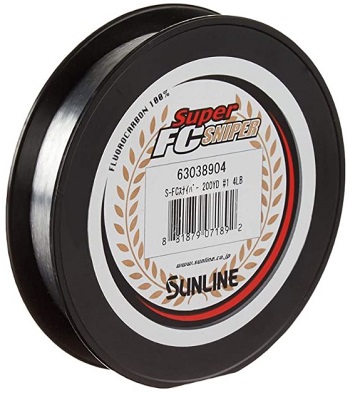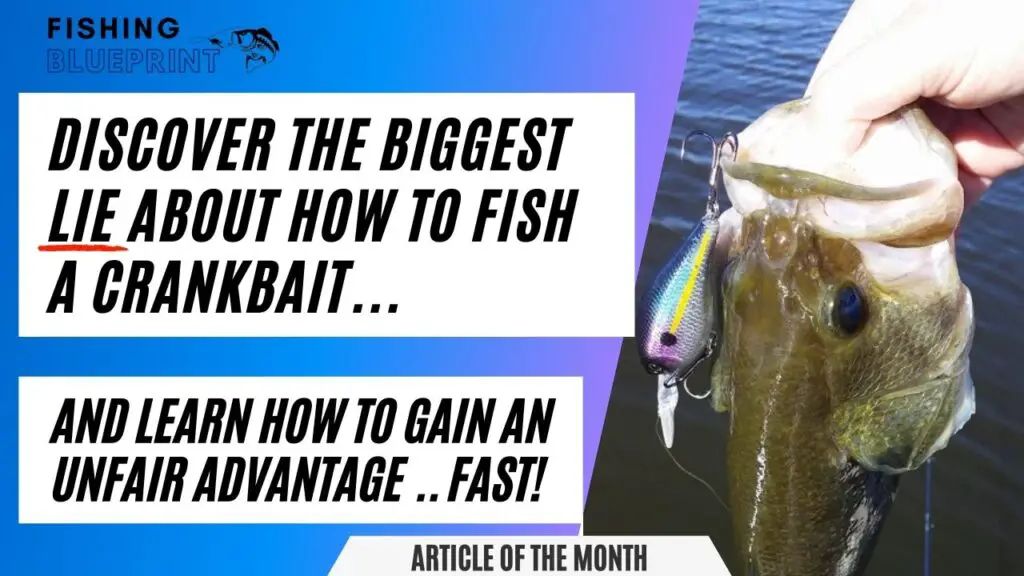How To Rig A Spinnerbait, Set Up, And Tie On Without Having To Hire An Expensive Charter Guide For One On One Instruction or Spend Hours Watching Useless Videos That Don't Help At All.
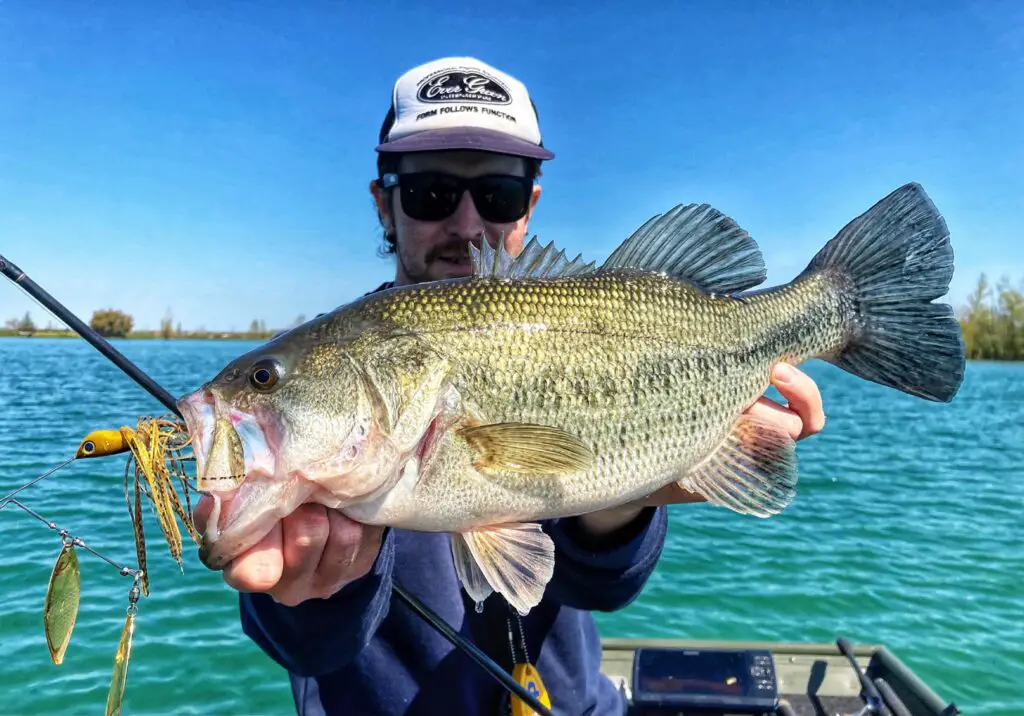
Everyone’s talking about spinnerbait fishing, right?
We all know the frustration of fishing the perfect spot only to have a giant bass follow your bait and not bite… or even worse your spinnerbait start to roll over on itself and spook off the fish…
But what almost no one understands about spinnerbait fishing is the concept of how to rig, set up, and tie on a spinnerbait the right way.
It’s not casting your bait out a million times that help you catch bass, it’s learning how to rig and set up a spinnerbait the right way the first time out the gate.
We created an easy-to-follow list of the best-of-practice tips and how-tos, so you can utilize them. That way you can rig up and tie a spinnerbait and fish any guy down the bank.
Setting up your spinnerbait correct way, the first time will absolutely put you in a position to start catching bass quickly…
And that can happen even if you are a weekend warrior bass angler…
Just make sure you use these tools and tips that we given you in the report below.
Key Takeaways
For most anglers learning how to rig a spinnerbait can seem pretty exciting, yet somewhat intimidating. Here is a quick and easy to follow list to help you get started fast!
- First, start by choosing the correct color skirt. (Or you can easily make your own custom skirt if you’re feeling crafty)
- Trim your spinnerbait skirt to give it the most action.
- Then add either a trailer hook or soft plastic trailer bait.
- Finish rigging your spinnerbait by tying on your spinnerbait with the correct knot.
Learning how to rig a spinnerbait the correct way from the start will absolutely put you in a position to quickly start catching bass…
And that can happen even if you are a weekend warrior bass angler…
Just make sure you use these tools and tips that we given you in the report below.
WARNING: There’s a lot of information about this subject you’ll probably want to come back to. No one expects you to remember all these tips. We know your time is precious, so we really tried to over-deliver in value for you. Additionally, we frequently update reports like this, so you’ll want to stay up to date with any changes or additional tips we include for you.
We found that the easiest way to save and bookmark this report so you can come back to it later is to share it on your favorite social media platform, especially if you use your phone to get important tips like the ones in this report here…
Click on your favorite social media buttons to remember this page now!
How to rig a spinnerbait
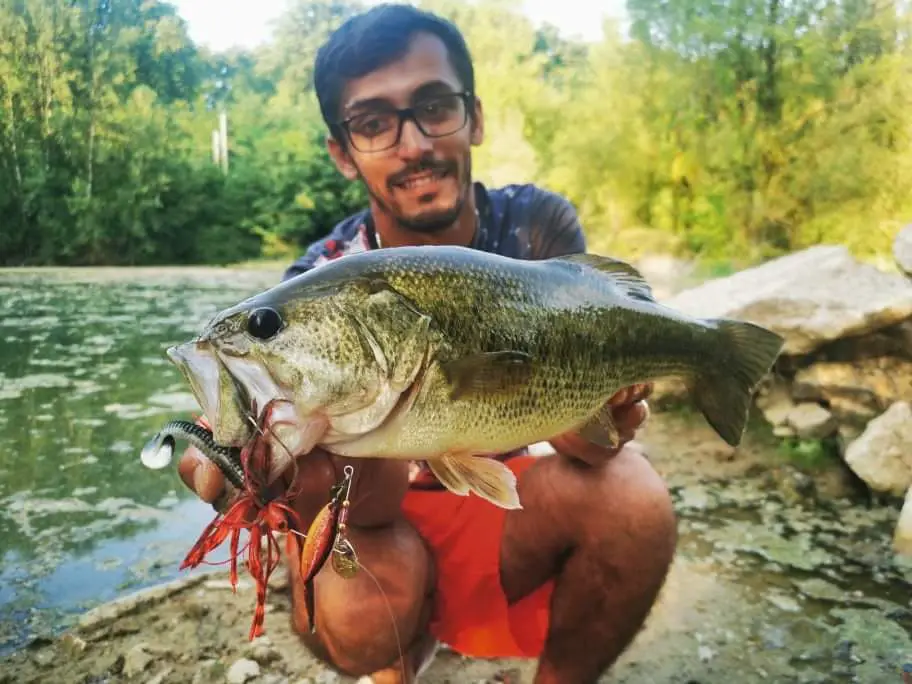
Spinnerbaits have been catching bass for decades and are a wonderful lure for bass fishing.
Mastering their complexities will help you differentiate your bait from everyone else, resulting in more and larger bass being caught.
This article will show you how to rig a spinnerbait so that you can get the most out of it.
With that said, let’s get right in and get serious about fishing.
There are a variety of rigging choices that might help you get the most out of your spinnerbait.
On top of that, optimizing your lure has a direct correlation that will result in more fish caught, which will lead to more confidence while bass fishing.
Let’s have a look at a number of rigging ideas that can help you get the most out of your spinnerbait.
Step 1: Choose a spinnerbait with good durability
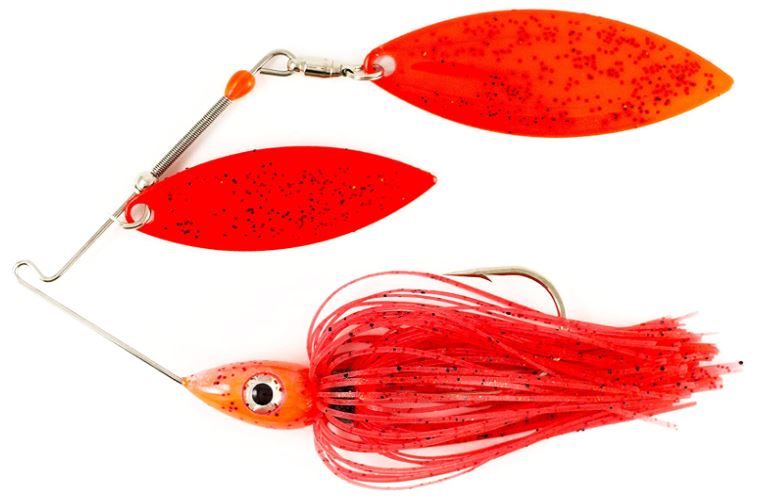
In the previous report called, ‘Discover! What Is A Spinnerbait And Other Secrets That Could Help You Fast!‘, you were given close-to-the-vest insider knowledge on what makes a spinnerbait really tick.
To read that report first, and then come back click here.
it was highlighted that utilizing thin wire spinnerbaits with an R-bend can be very flimsy, however they consistently produce the best vibration.
Inversely, if you use a spinnerbait with a very thick gauge wire the durability will increase, unfortunately, the spinnerbait will have very little vibration and it may also cause your lure to roll on its side.
There are two methods for rigging a spinnerbait that results in increased durability.
The most common way to extend the life of your spinnerbait is to use monofilament as a leader line. This reduces the pressure on the wire, allowing it to last longer.
Another option that has been used is to add a split ring or a thinly cut section from some small tubing over the R bend.
As a result, when battling a bass, the wire will be limited in its ability to flex, thus the wire’s life is extended.
The main advantage is that, unlike a twisted or looped eyes spinnerbait, it does not diminish the bait’s vibration.
Our data showed, time and time again, most professional anglers will choose a monofilament leader line over adding splint ring.
Step 2: Choose the best skirt when rigging your spinnerbait

In its most basic definition, for dirty water, muddy or murky water, a dark spinnerbait is the best choice. It can be black, blue, or purple.
A shad pattern, white, and chartreuse will also produce if the water is clear.
However, there are so many other circumstances that would justify a change in blade or skirt color.
Below is a guide for you to help you decide what spinnerbait color works the best.
| Season / Situation | Spinnerbait Blade color | Skirt Color |
|---|---|---|
| Spring - Clear water | Chrome | Shad pattern* or white |
| Spring - Murky or dirty water | Gold, red, orange | Dark: Blue, black, or red |
| Spring - fishing around bluegill beds | Gold, blue, black or purple | Bluegill pattern, or chartreuse |
| Summer - Clear water | Chrome | Shad pattern, all white, white/chartreuse |
| Summer - Murky or dirty water | Gold or copper | white, chartreuse, black |
| Fall - Clear water | Chrome | Shad pattern, all white, white/chartreuse |
| Fall - Murky or dirty water | Gold, blue, black or purple | Shad pattern , all white, Bluegill pattern, or chartreuse |
| Winter - Clear water | chrome, brushed nickel, black, or brown | Shad pattern, bluegill pattern, craw pattern |
| Winter - Murky or dirty water | Gold, red, orange, or black | White, black, brown, or red |
Step 3: Consider making a spinnerbait skirt
Many businesses provide a large range of skirting material and skirting tabs.
Because some skirt patterns are already created, the possibilities are infinite.
If you’re unsure about which colors you want, you may always get a starting kit.
Typically, a spinnerbait starting kit will include a variety of tab colors, as well as skirt collars and a skirt tool.
The skirt tool has a tubular part and a sharp tip, almost like a pencil tip.
You want to place that pencil tip in the tubular end
The sole function of the skirt tool is to allow you to put those little rubber skirt collars onto your tool.
You can slide on one single collar or as many as you want if you’re making multiple skirts.
Once you slide on collars on the skirt making tool you can take off the pointy tip.
The skirt tool also comes with a small little wire tool.
Here its purpose is to be inserted into and out through the end of the tool.
Select 2-3 of your favorite tabs and using the wire tool hook end, hook the middle of the silicone skirt tabs.
Now pull the tabs into the skirt tool.
Then slide one rubber collar onto the skirt strands.
Unhook and remove the wire skirt tool and pull out the skirt.
Adjust and move the collar so it separates the skirt into a 50-50 ratio.
Now your skirt is complete!
Helpful tip: "If you make your own spinnerbait skirts it allows you to match the hatch more efficently."
Here are some quality spinnerbait skirt kits for you to consider...
#ad / Images from Amazon Product Advertising API
Step 4: Rig your spinnerbait with the correct skirt
First, choose the spinnerbait skirt that you want.
If the skirt you want to use is a rubber band, it will commonly have the rubber band positioned in the middle of the skirt.
Next, push the rubber band closer to one side.
It’s important to have one side longer than the other.
The reason is it will cause the skirt to fan out and the replacement skirt will have more action.
Next, thread on the skirt.
You want that hook to be smack dab in the middle.
Make sure the collar is centered around the hook.
Simply shove the skirt down to the collar.
You should notice a tiny lip around the back of the spinnerbait head. That’s a skirt collar holder.
Finally, Just push the spinnerbait skirt over the collar holder and you’re done!
#ad / Images from Amazon Product Advertising API
Replace a spinnerbait skirt (in needed)
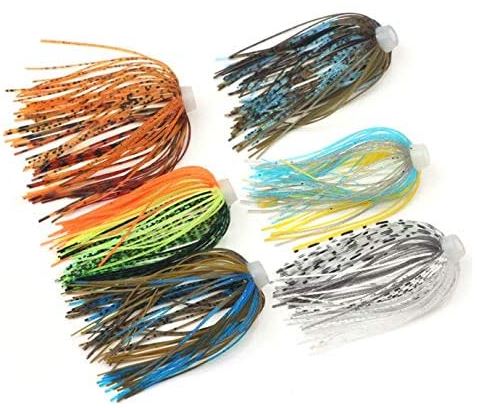
So you just grab ahold of the old skirt and just peel it off the hook.
Now choose the replacement skirt that you want
Thread the hook through the middle of the collar.
Push the skirt up and over the skirt collar.
Adjust the skirt strands evenly around the skirt collar.
| # | Preview | Product | Rating | |
|---|---|---|---|---|
| 1 |

|
Z-Man Chatter Bait Ez Skirt, One Size, Chartreuse Silver/White Silver | No ratings yet | Learn More |
| 2 |

|
Z-Man EZ Skirt Replacement Skirts - 3 pk - White Silver Glitter Scales | No ratings yet | Learn More |
| 3 |

|
Z-MAN Chatter Bait Ez Skirt, One Size, Black Blue Chrome/Blue Tips | No ratings yet | Learn More |
#ad / Images from Amazon Product Advertising API
Step 5: Trim the spinnerbait skirt
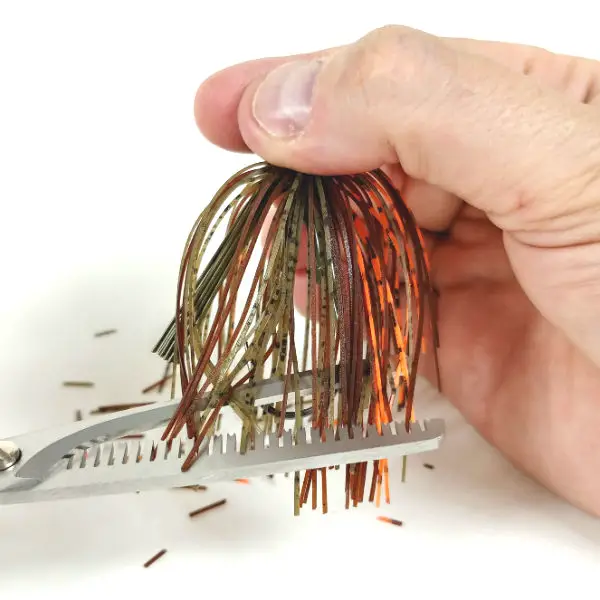
When you’re learning how to how to rig a spinnerbait, the most common modification to trim and modify the skirt of your spinnerbait is to give it a jig the weathered look.
If I’m at home I will take a pair of thinning shears used by hairstylists. You can buy these at Amazon and they’re super cheap.
What I’ll do is I will push the skirt down past the end of the hook and start doing my trimming.
Remember you can always take more off but you can never put back on, so take it slow at first and don’t be too gung-ho about taking off the skirt.
It’s best to practice on a couple of spinnerbaits you don’t really like before you go and modify your favorite spinnerbaits.
Normally, you should start trimming the skirt right at the bend of the hook. Then you need to trim again, this time a little higher up (approximately ½ inch from the first cut.
This skirt modification will give your spinnerbaits a “weathered” beaten up and eaten up look that the bass absolutely love!
Here are some quality spinnerbait skirt thinning scissors for you to consider...
#ad / Images from Amazon Product Advertising API
Step 6: (Optional) Consider putting on a trailer hook
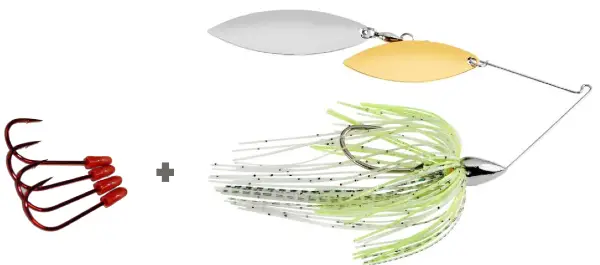
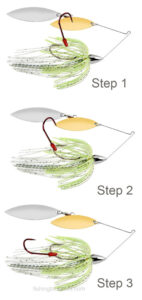 Trailer hook rigging can be done in a few different ways which all can be effective.
Trailer hook rigging can be done in a few different ways which all can be effective.
A free-swinging hook is the first, and best option.
The second option (and least popular) is one that keeps the hook in place.
Most professionals we interviewed recommended the free-swinging hook type.
The free-swinging hook gives you a higher chance of hooking up while also boosting your chances of catching the fish.
Because you enable the hook to move around freely, the leverage required to throw the bait is minimized.
Here are some quality spinnerbait trailer hooks for you to consider...
| # | Preview | Product | Rating | |
|---|---|---|---|---|
| 1 |

|
50pcs Trailer Fishing Hooks for Short Strikes – 1/0, 2/0, 3/0 with Beads - Pair with Spinnerbait,... | No ratings yet | Learn More |
| 2 |
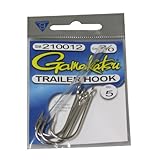
|
Gamakatsu Spinner Bait Trailer Hook Silver | No ratings yet | Learn More |
| 3 |

|
Bass Advantage Trailer Hooks for Spinnerbaits – High Carbon Steel Fishing Hooks with Large Eye –... | No ratings yet | Learn More |
#ad / Images from Amazon Product Advertising API
Step 7: Select the best trailer for your spinnerbait

Any soft plastic lure may be made into a spinnerbait trailer bait, or it can be modified to be one.
Using a trailer bait not only gives the bait a more realistic profile, but it also gives you greater control over it.
The spinnerbait will likely ride higher in the water column if you add a large body soft plastic.
Obviously, when a trailer bait is required, this isn’t always the desired result.
The bait will remain down on the retrieve if you use a thinner plastic.
These are the most important considerations when selecting a trailer.
The trailers for spinnerbaits that experts have been filmed using and talking about are listed below.
However…
If you really want to learn the exact secrets on how the Pros fish spinnerbaits, especially with these trailers you need to read this report right now, How To Fish A Spinnerbait The Right Way [21 Mistakes To Avoid & Tips To Use Right Now!]
Every minute you wait is another minute someone else learns these close-to-the-chest secrets and ends up catching your fish…
Put the power of “fishing a spinnerbait the right way” to work for you so you can quickly and easily start catching fish, keep more money in your pocket for buying the correct spinnerbaits, and keep control of the exact performance you want and save time!
Here are some soft plastic swimbait trailers for you to consider...
| # | Preview | Product | Rating | |
|---|---|---|---|---|
| 1 |

|
TRUSCEND Fishing Lures for Bass Trout Jighead Lures Paddle Tail Swimbaits Soft Fishing Baits... | No ratings yet | Learn More |
| 2 |

|
Berkley Gulp! Paddleshad Fishing Soft Bait, Pearl White, 4" | No ratings yet | Learn More |
| 3 |

|
TRUSCEND 20PCS Soft Fishing Lures, Paddle Tail Swimbaits, Fishing Lures for Bass Trout Crappie... | No ratings yet | Learn More |
#ad / Images from Amazon Product Advertising API
Here are some soft plastic grub trailers for you to consider...
| # | Preview | Product | Rating | |
|---|---|---|---|---|
| 1 |

|
Yamamoto Gary 4" Fishing Single Tail Grub - Swimming Soft Plastic Bass Lure Baits - 20 Pack, Cream... | No ratings yet | Learn More |
| 2 |

|
Yamamoto Gary 4" Fishing Single Tail Grub - Swimming Soft Plastic Bass Lure Baits - 20 Pack, Green... | No ratings yet | Learn More |
| 3 |

|
Berkley Gulp! Grub White, 6in | No ratings yet | Learn More |
#ad / Images from Amazon Product Advertising API
Here are some soft plastic craw trailers for you to consider...
| # | Preview | Product | Rating | |
|---|---|---|---|---|
| 1 |

|
Strike King Rage Craw 4-Inch Fishing Lure, Soft Plastic Grub, Unique Design, Realistic Pincers,... | No ratings yet | Learn More |
| 2 |

|
Strike King Rage Bug Fishing Lure, Soft Plastic Craw, Bama Bug, 4-Inches, 7-Pack | No ratings yet | Learn More |
| 3 |

|
Yum Lures Wooly Bug Creature Bait Soft Plastic Bass Fishing Lure, Ultimate Craw, 3.25'' | No ratings yet | Learn More |
#ad / Images from Amazon Product Advertising API
Step 7: Tie a spinnerbait
How To Tie A Spinnerbait
Step 1 – Take your fishing line and hold the spinnerbait with your non-dominant hand.
Thread the line behind the R-bend of the spinnerbait.
NOTE: The end of your fishing line is called the “tag line”, and the line that is going to the rod is called the “mainline”.
Step 2 – Take your index finger from your non-dominant hand and put it in front of the R-bend of the spinnerbait.
Then bring about eight inches of line out.
Step 3 – Now what you have to do is start wrapping the tag line around the mainline, away from the lure. Wrap it around 5-7 times.
Step 4 – Once you finish wrapping, you’ll notice an opening right where your index finger is at.
Take the tag line and thread it through that opening.
Step 5 – Now take that tag line and thread it back through the loop that you just created by threading the tag line through the first hole.
Step 6 – Wet it with some saliva and cinch it tight. Be sure to check for any line slippage.
Best line for spinnerbait fishing
Fluorocarbon – Fluorocarbon has been shown to be the most popular and dependable fishing line for spinnerbaits.
Most professionals will fish on average is a 10 point test line…
Even more so, other common responses we received are anglers will also fish between an 8-12 pound test based on water clarity and the amount of structure they’re fishing around.
Fluorocarbon line has very little stretch, it’s incredibly sensitive.
Furthermore, it’s very easy to cast and it avoids line twists.
It has the easy hook-setting capability if a fish bites your lure at the end of your cast, whereas monofilament can be stretchy, limiting you to get a solid hook set.
Sunline Sniper FC is one of our favorites because of its tensile strength and incredible durability.
Monofilament – Mono is, without a doubt, the greatest option for someone who is on a budget.
Mono is known to have much stretch on the hookset, however, if you use higher diameter line the amount of stretch is decreased.
Mono also floats causing your spinnerbait to swim a little higher in the water column.
When a large fish slams against a spinnerbait, your line must be able to withstand the strain without snapping, and your knot must be secure, this is where mono shines in this area, simply put.
By the way, if you really want to get started with insider information and catching bass insanely fast, while avoiding months of research and frustration, check this out click HERE to learn more!
Here are some other quality fluorocarbon fishing line options for you to consider...
| # | Preview | Product | Rating | |
|---|---|---|---|---|
| 1 |

|
Seaguar Red Label 100% Fluorocarbon Fishing Line 10lbs, 200yds Break Strength/Length - 10RM250 | No ratings yet | Learn More |
| 2 |

|
Berkley Vanish®, Clear, 10lb | 4.5kg, 110yd | 100m Fluorocarbon Fishing Line, Suitable for... | No ratings yet | Learn More |
| 3 |

|
Berkley Vanish®, Clear, 10lb | 4.5kg, 250yd | 228m Fluorocarbon Fishing Line, Suitable for... | No ratings yet | Learn More |
#ad / Images from Amazon Product Advertising API
Make Your Own Spinnerbait
Check out this great video above, it goes over how to change out your spinnerbait blades so you can fish the best color spinnerbait, which provides you more chances to get bit!
Here’s the list of materials mentioned in the video.
FAQ
What is the best rod for a spinnerbait?
When fishing a spinnerbait you definately need a rod that can easily cast the lure out and strong enough to wrestle in the biggest bass of the lake.
But listen… if you really want to catch a TON of bass, we created an Official Buyers Guide to Choosing the Best Rod for Spinnerbait Fishing it lays it all out for you! Check it out here click HERE to learn more!
>> Learn More: Best Spinnerbait Rod Rod Buyers Guide 2022 (St. Croix, Shimano, Diawa, and More!)
How deep can you fish a spinnerbait?
You can fish a spinnerbait at nearly any depth.
However, most anglers will fish them between 1 and 20 feet.
With very little additional work on your part, you can alter the bait run virtually exactly at the target depth once you know it.
However, running your spinnerbait at a depth of 10+ feet you’ll probably need to alter the bait a little, by switching out to a smaller set of blades.
You can also buy a spinnerbait specifically designed to run deep, such as the Strike King Bottom Dwelling Spinnerbait.
It has narrower, slightly smaller blades that help keep the bait from riding up too much off the bottom during the retrieve.
Do spinnerbaits work in the ocean?
Absolutely! If you’re fishing in one of your local harbors or bays, there’s a very strong possibility you’ll be in an area where there’s a lot of eelgrass.
This grassy region is where Calico Bass, Sand Bass and Spotted Bay Bass like to hide and hunt for food.
The spinnerbait is a very efficient technique for catching fish around this submerged saltwater grass.
A slow retrieve hugging the bottom is generally enough to elicit a large strike.
Occasionally, you get grass on your lure, but that only means you’re fishing the correct depth!
The best anglers will cast out as far as they can and let the bait sink to the bottom before working it back up and over the tops of the grass.
What to do if a bass short-strikes your spinnerbait?
When bass strike a spinnerbait short, they frequently strike the blade rather than the hook.
The first thing that comes to mind is to bend the spinnerbait down to bring the hook closer to the blade.
You can sometimes add a trailer hook to have two hooks close to the blade.
If they’re still striking the blade, it’s possible you’ll need to replace the skirt.
How to clean spinnerbait blades?
Have you ever wondered how you put the shine back on your old spinnerbait blades. And how do you keep them shiny?
There are four popular ways to know how to clean your spinnerbait blades and keep them polished and shiny.
- Brasso. It’s easy to find at nearly any home improvement store. It is mind-blowing how easy it brings the shine back.
- MAAS Polishing Creme. This stuff works on nearly all common spinnerbait blades. A littel goes a long way. You can pick up a 2 oz tube at Walgreens or Amazon for around $8-$10 dollars.
- Mr Clean Magic Pad – Just get it wet and it acts like a polishing cloth
- 100% vinegar and cotton wipes.
Do colored spinnerbait blades work?
Yes, they do in specific situations.
Using colored spinnerbait blades is similar to the general spinnerbait skirt color hypothesis: When light penetration is limited (like in muddy water), typical metallic blades will not reflect as much light.
So anglers must adapt and switch to solid, vibrant or fluorescent colored blades.
Where do you put spinnerbaits?
The best and cheapest way to store spinnerbaits is in flat spinnerbait box containers.
These are similar to standard tackle boxes, except instead of simple dividers, they have notches cut into them to allow you to line up the spinnerbaits in the box.
Here are the advantages and disadvantages.
These bait boxes can efficiently store a large number of spinnerbaits.
The boxes may be stored in the same location as your other boxes, which is ideal for boats with box slots.
Some of the less expensive boxes, spinnerbaits will tend to shift around far too much, which could cause unneeded scratches on the blades.
If you buy a spinnerbait storage box, I strongly recommend you avoid a spinnerbait storage box with no divisions at all in them.
No-division boxes are a problem because the spinnerbaits are stacked on top of each other, making it difficult to remove them and even more difficult to put them away.
To make matters worse, it might be difficult to see each spinnerbait and rapidly choose the right spinnerbait for the job.
Personally I use the Plano SpinnerBait StowAway Multi-Compartment Box. I don’t have shifting spinnerbaits and the box holds up really well.
Checkout These Other Spinnerbait Articles...
- BEST Spinnerbaits for Bass 2022: Top Picks the Pros Refuse to Talk About
- [Official] Buyers Guide to Choosing the BEST ROD for Spinnerbait Fishing
- Dirty Secret On HOW TO FISH A Spinnerbait [Even Your Pastor will be Envious!]
- Discover! What Is A Spinnerbait And Other Secrets That Could Help You Fast!
- How To RIG A Spinnerbait – 30+ Ways To Choose, Set Up, And Tie On A Spinnerbait The Right Way!
More articles just for you...
Funny Fishing Rules, Laws, and Regulations 2025
Crazy Fishing Laws That Will Blow Your Mind! #7 is INSANE! Strange Fishing Regulations and Laws As silly as hook and rod limits may seem,
EXPOSED! How To Use A Spinnerbait The Right Way for 2025
Are You Wondering How To Use A Spinnerbait? Or How To Work A Spinnerbait Over Grass, Logs, or Points? Well, All These Questions Are Answered
EXPOSED! Best Crankbait Colors for 2025 [Which to Buy & Avoid]
What color crankbait to use? Crankbait Color Chart I just love going into a Bass Pro Shops store and just staring at all the walls
Best Underwater Dock Lights For Fishing – 2025 Buyers Guide
Night Dock Light Fishing For Beginners Dear fellow angler, Does this sound like you? You’re someone who loves fishing but just wants to escape the
15 Best Deep Diving Crankbaits [2025 Buyers Guide – Which to Buy & Avoid]
A Complete Buyer’s Blueprint On The Best Deep Diving Crankbaits for Bass, Walleye, or Striped Bass On The Market Today Fishing deep diving crankbaits can









